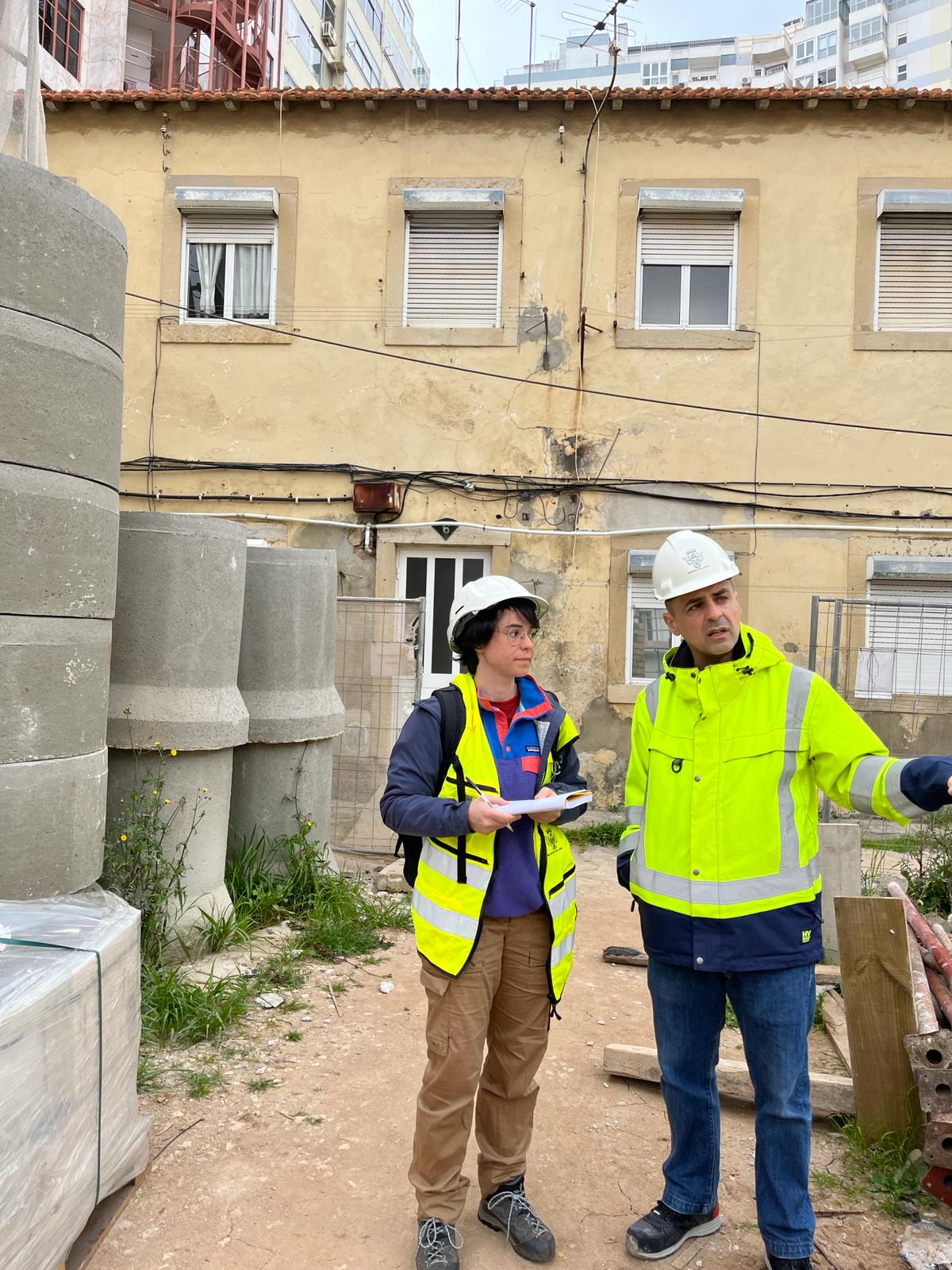A hidden potentiality on the field
Posted on 11-07-2024
At the beginning of 2024, I conducted a secondment at the Department of housing policies at Lisbon City Council. Since I was carrying out research on collaborative housing and innovation, I searched for an experiment in the field of housing to compare with the case I studied in Bologna. The Italian case (co-housing Porto15) had been developed through a public intervention that aimed to build a community of residents that shared spaces and promoted a more sustainable lifestyle in the neighbourhood.
My colleagues from the housing policies department where I was based piqued my interest by telling me about an innovative rehabilitation project that experimented with Tetris to avoid relocating residents into temporary housing. Thus, it aimed to protect the community living there. The construction site was confined to a part of the building while residents continued to live in the remaining part, with the living place and the building site switching in the subsequent phases of the project. This is Vila Romão, an old workers' villa owned by the Municipality of Lisbon, which was undergoing rehabilitation during my secondment due to the precarious conditions of the building.
The municipality of Lisbon and the construction team took on the challenge of integrating residents into the retrofitting project, considering this the most suitable approach to the residents’ needs and life conditions. What was even more interesting was that this challenge concealed another one: the integration of a vulnerable resident population into a retrofitting project.
The municipality faced this challenge by successfully involving individuals with special social skills in the renovation works. The building company carrying on the renovation was unique in agreeing to work under conditions that required extra workload for temporary connections of electricity, gas, and energy, and their maintenance, along with continuous efforts to interact with residents. Additionally, the municipal coordinator of the rehabilitation was explicitly chosen by the municipality for her profile and attitude. She was favourable to working in an environment of close proximity with residents and appreciated human contact.
Upon arriving for my first site visit, it became clear that the project activated unusual dynamics of collaboration and housing coexistence. I wouldn’t thought the municipality’s staff together with the building company would have been fulfilling some kind of locally-based social assistance. In fact, the integration of residents was not only physical but also social and relational. The residents and the construction team crossed each other’s space trajectories, had continuous daily interactions and developed a singular urban coexistence. I surprisingly observed effective neighborhood ties between the team of construction workers, the municipal services overseeing the on-site work, and the residents of the building.
The residents were predominantly elderly individuals, part of a historical working-class community. Most residents were significantly frail and supported by a social worker due to mental, social, or physical challenges that obstructed their daily life. Indeed, the continuous presence of civil servants, engineers, construction workers, and the entire building team created opportunities for residents to seek for practical and social help. R. (86 years old, F) said that they are "all good kids" and she could ask several times for practical tasks like moving furniture or retrieving a cat stuck behind an armchair. E. (82 years old, M) said that it now feels like being back with family, just like when he was a child. What I found particularly valuable was that in this unusual situation of living on a building site, with noise, confusion, dust, and waste storage, residents had the opportunity to be heard, to talk to someone, and to receive a kind of social assistance for different unmet needs, including administrative and digital ones.
I was very enthusiastic to see that help relations were reciprocal: residents played an important role in the progress of the construction works. They acted as proper guardians and controlled the site, providing significant help against risks such as theft of building materials or the access of unauthorized persons. In this way, they gained a different role than merely being beneficiaries of a renovation project and passively receiving a service.
Integrating vulnerable residents into a retrofitting project, which seemed to be a hidden challenge, finally appeared to have a huge potential. The environment I perceived was one of genuine mutual help and intense neighbourhood relations, where actors seized the opportunity not to be bound to social positions and to develop capacities to switch roles Actors engaged in a kind of role-playing that allowed professionals from the design and building fields to learn how to interact with a frail population, playing the role of social workers, while residents assumed roles of responsibility, becoming guardians and social controllers.
A hidden challenge potentiality on the field
At the beginning of 2024, I conducted a secondment at the Department of housing policies at Lisbon City Council. Since I was carrying out research on collaborative housing and innovation, I searched for an experiment in the field of housing to compare with the case I studied in Bologna. The Italian case (co-housing Porto15) had been developed through a public intervention that aimed to build a community of residents that shared spaces and promoted a more sustainable lifestyle in the neighbourhood.
My colleagues from the housing policies department where I was based piqued my interest by telling me about an innovative rehabilitation project that experimented with Tetris to avoid relocating residents into temporary housing. Thus, it aimed to protect the community living there. The construction site was confined to a part of the building while residents continued to live in the remaining part, with the living place and the building site switching in the subsequent phases of the project. This is Vila Romão, an old workers' villa owned by the Municipality of Lisbon, which was undergoing rehabilitation during my secondment due to the precarious conditions of the building.
The municipality of Lisbon and the construction team took on the challenge of integrating residents into the retrofitting project, considering this the most suitable approach to the residents’ needs and life conditions. What was even more interesting was that this challenge concealed another one: the integration of a vulnerable resident population into a retrofitting project.
The municipality faced this challenge by successfully involving individuals with special social skills in the renovation works. The building company carrying on the renovation was unique in agreeing to work under conditions that required extra workload for temporary connections of electricity, gas, and energy, and their maintenance, along with continuous efforts to interact with residents. Additionally, the municipal coordinator of the rehabilitation was explicitly chosen by the municipality for her profile and attitude. She was favourable to working in an environment of close proximity with residents and appreciated human contact.
Upon arriving for my first site visit, it became clear that the project activated unusual dynamics of collaboration and housing coexistence. I wouldn’t thought the municipality’s staff together with the building company would have been fulfilling some kind of locally-based social assistance. In fact, the integration of residents was not only physical but also social and relational. The residents and the construction team crossed each other’s space trajectories, had continuous daily interactions and developed a singular urban coexistence. I surprisingly observed effective neighborhood ties between the team of construction workers, the municipal services overseeing the on-site work, and the residents of the building.
The residents were predominantly elderly individuals, part of a historical working-class community. Most residents were significantly frail and supported by a social worker due to mental, social, or physical challenges that obstructed their daily life. Indeed, the continuous presence of civil servants, engineers, construction workers, and the entire building team created opportunities for residents to seek for practical and social help. R. (86 years old, F) said that they are "all good kids" and she could ask several times for practical tasks like moving furniture or retrieving a cat stuck behind an armchair. E. (82 years old, M) said that it now feels like being back with family, just like when he was a child. What I found particularly valuable was that in this unusual situation of living on a building site, with noise, confusion, dust, and waste storage, residents had the opportunity to be heard, to talk to someone, and to receive a kind of social assistance for different unmet needs, including administrative and digital ones.
I was very enthusiastic to see that help relations were reciprocal: residents played an important role in the progress of the construction works. They acted as proper guardians and controlled the site, providing significant help against risks such as theft of building materials or the access of unauthorized persons. In this way, they gained a different role than merely being beneficiaries of a renovation project and passively receiving a service.
Integrating vulnerable residents into a retrofitting project, which seemed to be a hidden challenge, finally appeared to have a huge potential. The environment I perceived was one of genuine mutual help and intense neighbourhood relations, where actors seized the opportunity not to be bound to social positions and to develop capacities to switch roles Actors engaged in a kind of role-playing that allowed professionals from the design and building fields to learn how to interact with a frail population, playing the role of social workers, while residents assumed roles of responsibility, becoming guardians and social controllers.



